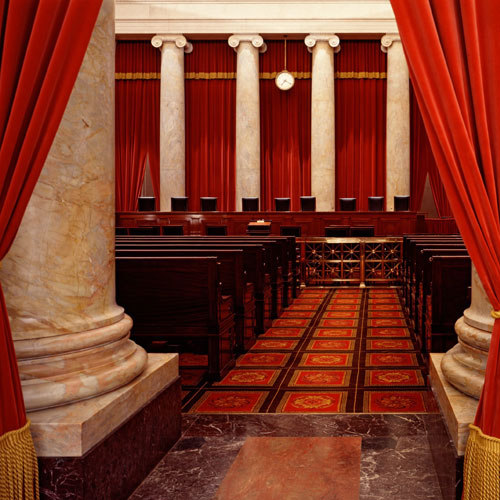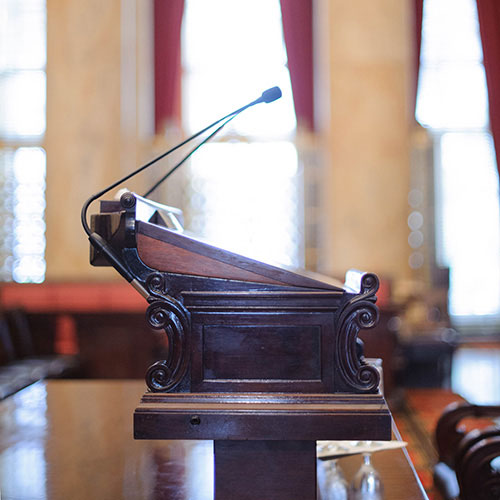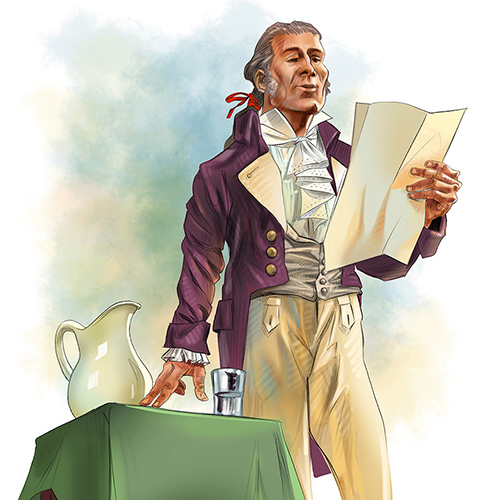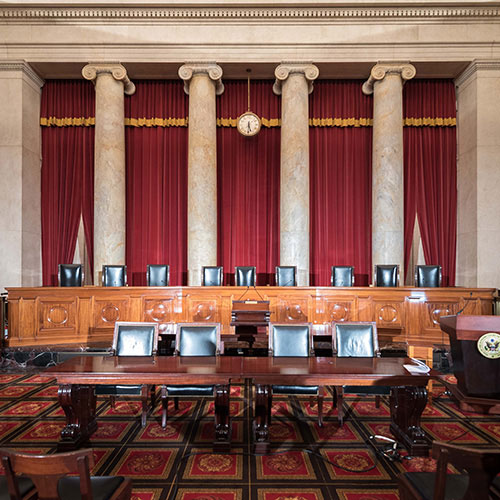Part 1 (Complete)
In Hoffa’s Shadow: Chuckie O’Brien, the Supreme Court, and a Son’s Search for the Truth
A Lecture by Professor Jack Goldsmith
Original Event Details:
Charles “Chuckie” O’Brien (December 20, 1933 – February 13, 2020)[1] was an American labor union organizer. He was closely linked to International Brotherhood of Teamsters President Jimmy Hoffa and referred to himself as Hoffa’s stepson. In 1967, the Supreme Court ruled in his favor in O’Brien v. United States, vacating his conviction for “removing merchandise from a bonded area under the supervision of the United States Customs Service” and remanding the case to the lower court. That is where our story begins. What happened to Mr. O’Brien after the Supreme Court ruled in his case?
As a young man, Jack Goldsmith revered his stepfather, longtime Jimmy Hoffa associate Chuckie O’Brien. But as he grew older and pursued a career in law and government, he came to doubt and distance himself from the man long suspected by the FBI of perpetrating Hoffa’s disappearance on behalf of the mob. It was only years later, when Goldsmith was serving as assistant attorney general in the George W. Bush administration, that he began to reconsider his stepfather and to understand Hoffa’s legacy.
Professor Goldsmith wrote In Hoffa’s Shadow to share how he reunited with the stepfather he’d disowned and then set out to unravel one of the twentieth century’s most persistent mysteries and Chuckie’s role in it.
 Jack Goldsmith is a Learned Hand Professor of Law at Harvard University. He is the author of In Hoffa’s Shadow: A Stepfather, A Disappearance in Detroit, and My Search for the Truth, as well as other books and articles on topics related to presidential power, terrorism, national security, international law, and internet law. Before coming to Harvard, Goldsmith served as Assistant Attorney General, Office of Legal Counsel, from October 2003 through July 2004, and Special Counsel to the General Counsel to the Department of Defense from September 2002 through June 2003. Goldsmith taught at the University of Chicago Law School from 1997-2002, and at the University of Virginia Law School from 1994-1997. He holds a J.D. from Yale Law School, a B.A. and M.A. from Oxford University, and a B.A. from Washington & Lee University. He clerked for Supreme Court Justice Anthony M. Kennedy, Court of Appeals Judge J. Harvie Wilkinson, and Judge George Aldrich on the Iran-U.S. Claims Tribunal.
Jack Goldsmith is a Learned Hand Professor of Law at Harvard University. He is the author of In Hoffa’s Shadow: A Stepfather, A Disappearance in Detroit, and My Search for the Truth, as well as other books and articles on topics related to presidential power, terrorism, national security, international law, and internet law. Before coming to Harvard, Goldsmith served as Assistant Attorney General, Office of Legal Counsel, from October 2003 through July 2004, and Special Counsel to the General Counsel to the Department of Defense from September 2002 through June 2003. Goldsmith taught at the University of Chicago Law School from 1997-2002, and at the University of Virginia Law School from 1994-1997. He holds a J.D. from Yale Law School, a B.A. and M.A. from Oxford University, and a B.A. from Washington & Lee University. He clerked for Supreme Court Justice Anthony M. Kennedy, Court of Appeals Judge J. Harvie Wilkinson, and Judge George Aldrich on the Iran-U.S. Claims Tribunal.Part 2 (Complete)
Denied but Not Defeated: Myra Bradwell and the Battle for Women in Law
A Lecture by Siobhan Barco
View Event Online:
Original Event Information
Myra Colby Bradwell (February 12, 1831 – February 14, 1894) was a Chicago publisher and political activist. She attempted in 1869 to become the first woman to be admitted to the Illinois bar to practice law but was denied admission by the Illinois Supreme Court in 1870 because of her sex. She was denied again on appeal to the Supreme Court of the United States in Bradwell v. Illinois (1873). What happened to Ms. Bradwell after her case was decided?
 Siobhan Barco is a PhD candidate at Princeton University where she studies American legal history in the nineteenth and twentieth centuries. Her research explores how the lives of women, the development of law, and the dissemination of printed materials have been intertwined across the span of American history. She is the producer and host of the American Society for Legal History’s Talking Legal History podcast and serves on the advocacy committee of the National Association of Women Lawyers.
Siobhan Barco is a PhD candidate at Princeton University where she studies American legal history in the nineteenth and twentieth centuries. Her research explores how the lives of women, the development of law, and the dissemination of printed materials have been intertwined across the span of American history. She is the producer and host of the American Society for Legal History’s Talking Legal History podcast and serves on the advocacy committee of the National Association of Women Lawyers.Part 3 (Complete)
The Vanishing of Lloyd Gaines: A Supreme Court Victory and a Civil Rights Mystery
A Lecture by Professor Kenneth W. Mack
Video Credit: C-Span
Lloyd Gaines (1911 – disappeared March 19, 1939) was born in Mississippi and moved to Missouri with his mother and siblings. He attended the Blacks-only Lincoln University in Jefferson City, Missouri. He then applied to the University of Missouri Law School, which did not admit Black students. With the help of the NAACP, he was the petitioner in Gaines v. Canada. In 1938, the Supreme Court held that states that provided a school for White students had to allow Black students to attend or provide a separate school for them. Shortly after this victory though, Lloyd Gaines disappeared. He was never found. What happened to Lloyd Gaines?
 Kenneth W. Mack is the inaugural Lawrence D. Biele Professor of Law and Affiliate Professor of History at Harvard University. He is also the co-faculty leader of the Harvard Law School Program on Law and History. He is the author of Representing the Race: The Creation of the Civil Rights Lawyer. Professor Mack is also the co-editor of In Between and Across: Legal History Without Boundaries and The New Black: What Has Changed—And What Has Not—With Race in America. His work has been published in the Harvard Law Review, Yale Law Journal, Journal of American History, Law and History Review and other scholarly journals. Before joining the faculty at Harvard Law School, he clerked for the Honorable Robert L. Carter, in the United States District Court for the Southern District of New York, and practiced law in the Washington, D.C. office of the firm, Covington & Burling.
Kenneth W. Mack is the inaugural Lawrence D. Biele Professor of Law and Affiliate Professor of History at Harvard University. He is also the co-faculty leader of the Harvard Law School Program on Law and History. He is the author of Representing the Race: The Creation of the Civil Rights Lawyer. Professor Mack is also the co-editor of In Between and Across: Legal History Without Boundaries and The New Black: What Has Changed—And What Has Not—With Race in America. His work has been published in the Harvard Law Review, Yale Law Journal, Journal of American History, Law and History Review and other scholarly journals. Before joining the faculty at Harvard Law School, he clerked for the Honorable Robert L. Carter, in the United States District Court for the Southern District of New York, and practiced law in the Washington, D.C. office of the firm, Covington & Burling.



